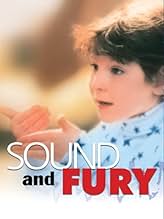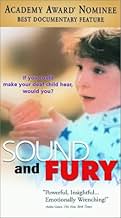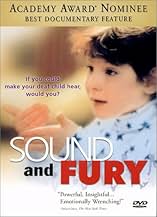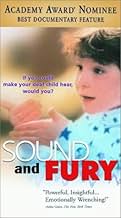Añade un argumento en tu idiomaIf you could make your deaf child hear, would you? Academy Award-nominated "Sound and Fury" follows the intimate, heart-rending tale of the Artinians, an extended family of deaf and hearing ... Leer todoIf you could make your deaf child hear, would you? Academy Award-nominated "Sound and Fury" follows the intimate, heart-rending tale of the Artinians, an extended family of deaf and hearing members, across three generations. Together they confront a technological device that can ... Leer todoIf you could make your deaf child hear, would you? Academy Award-nominated "Sound and Fury" follows the intimate, heart-rending tale of the Artinians, an extended family of deaf and hearing members, across three generations. Together they confront a technological device that can help the deaf to hear but may also threaten deaf culture--and their bonds with one another... Leer todo
- Nominado para 1 premio Óscar
- 3 premios y 5 nominaciones en total
Reseñas destacadas
When I saw this movie, I was able to see both sides of the story, it was very touching to me personally. I thought that it was so interesting the way everyone's values were in different places. This is such a good movie and it really portrays the dynamic of living in deaf household.
If you ever thought about how many ways people can be different, you should really watch this movie.
And these are the movies I value highest, because they cause you to *think* -- whereas most movies intend to produce the exactly opposite effect. Although I would not describe this movie as leaving one with a warm fuzzy feeling afterward, I will say that I am better for having watched it. It was a powerful reminder of the real danger that ignorance and pride pose to each of us in this world -- a danger that, both ironically and fittingly, we may never come to realize because of circumstances outside of our control.
Mostly this was hard for me because my mother, deaf from birth, had a cochlear implant over four years ago, with wildly successful results. She did not have the implant because people were pressuring her to do so, nor did she do it because she did not like herself the way she was, she did it in order to experience sound.
She was warned that it was very unlikely for her to develop speech recognition, and that the most she could hope for were recognition of environmental sounds. She asked me what I thought about it, and I said, "Go for it! It's worth a shot!" To me, and most of my family, the chance to hear music seemed worth it alone. So what she never becomes a "hearing person"- truly that's not the goal anyway. The point is that hearing sound is a tremendous experience most of the hearing world takes for granted, and if you have the opportunity to hear even some of the world of sound, why not take it?
My mother has never really been part of the deaf culture as defined by this film, she learned to lipread and speak excellently and was able to function very successfully without the ability to hear, as many deaf individuals do.
After she got the implant, my mother worked incredibly hard to develop speech recognition, astounding her audiologists. She truly proves that if you are highly motivated you can do it. She was also amazed at the things that made sound, plastic bags crinkling, dry autumn leaves under your feet, and the buzz of street lamps.
My mom would be the first to tell you that it's worth the risk, recovery and work required. Not because you become part of "the hearing world" but because you gain a sense. You can hear a child cry, a dog bark, a bird sing.
Personally, I feel really disgusted with parents of children who are eligible for the surgery and don't go for it. It's not a question of deaf culture or not- it's a question of knowingly depriving a child of the chance to develop their sense of hearing.
I object strongly to the deaf community's feeling that hearing people can't accept them the way they are. That may be some people's thinking, but it's not everyone's. I certainly didn't think that when my mother decided against the implant years ago, then for it four years ago. It was up to her at that point. With children, the chance for developing speech and speech recognition is so great, and so much slimmer if they were to wait- that deciding against it for a child is really taking away an opportunity that is once in a life time.
Is development of speech and the sense of hearing necessary for a child? Hearing people would say yes, many deaf people would say no. Fair enough. I agree that it's not necessary, but rather a luxury? Why not allow a person the opportunity to do it if the technology exists? Sign language and deaf culture will never be extinct, because the cochlear implant is not for every kind of hearing loss. It is also not a cure-all- an implant patient only hears when his or her implant is turned on. They are still deaf.
And in all honesty- does it really matter? If you have the chance to make your child's life easier and fuller by giving him or her the ability to hear sounds that perhaps you as a deaf parent never heard, it is selfish to stop them just because you yourself may never have the opportunity. A hearing child will still be a part of your family, hearing or not.
This film was a more than fair look at both sides of the issue, and produced in me a myriad of emotions and thoughts.
Like another reviewer noted, I found myself getting a little emotional at the end. In fact, throughout the movie I was emotionally involved with a subject matter I would never thought I would.
I was struck by the elitist nature of a certain element of the deaf community. Many of the deaf people in the film were extremely antagonistic toward anything that would remove deafness or a deaf person from their community. While this is understandable, I found it extremely selfish. Not only were many in complete denial that deafness inhibited their quality of life whatsoever (are we still allowed to use the word handicapped???), some considered it superior to the "hearing world." I noted with irony that many of the deaf family members at the picnic who were so repulsed by the idea of a cocklear implant were wearing glasses; obviously they considered being born with or having deteriorating eyesight something in need of fixing. Their attitude reminded me of other defensive groups such as un(der)educated parents (hey, I did OK, why does my son need to go to college) or racial minorities (oh, you just want to make her "white").
Even without the controversial subject of the cocklear implant this is a great study in generations as it is the old story of parents either wanting their kids (adult kids) wanting them to either be like them or to have it better than they had it.
¿Sabías que...?
- PifiasWhen Peter asks Nancy (the girl with the cochlear implant from the deaf family) if she socializes more with deaf or hearing, the voice-over says, "Mostly deaf people." However, she is actually signing, "Grandma and grandpa."
- Versiones alternativasA 60-minute version of this film is available from the Filmaker's Library.
Selecciones populares
- How long is Sound and Fury?Con tecnología de Alexa
Detalles
- Fecha de lanzamiento
- Países de origen
- Sitio oficial
- Idiomas
- Títulos en diferentes países
- Звук и ярость
- Empresas productoras
- Ver más compañías en los créditos en IMDbPro
Taquilla
- Recaudación en Estados Unidos y Canadá
- 114.882 US$
- Fin de semana de estreno en EE. UU. y Canadá
- 7104 US$
- 29 oct 2000
- Recaudación en todo el mundo
- 114.882 US$
- Duración
- 1h 20min(80 min)
- Color
- Mezcla de sonido
- Relación de aspecto
- 1.33 : 1






